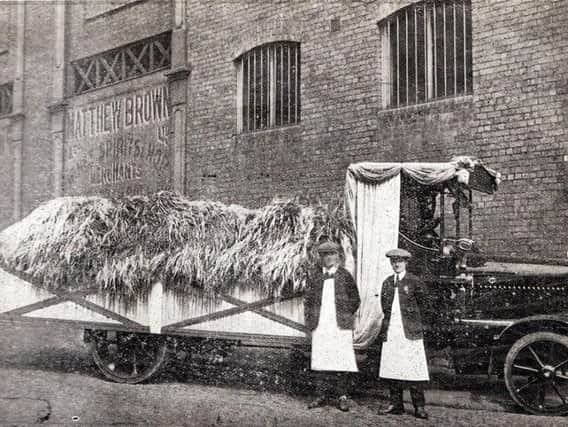History of brewing in Preston


Glance at Kelly’s Directory at the end of the 19th century and you will see that within Preston there were no less than 160 brewers, many of them individuals who brewed ale to draw from their own pumps in their inns or taverns. Back in those days ‘The Publican’s Guide To Brewing’ was essential reading for local publicans and for one shilling you could buy a copy from local printer George Bateman.Having obtained the knowledge Henry Sharples was brewing his own beer at the Queen Adelaide, as was New Hall Lane neighbour William Sharrock at the Carters Arms. The regulars at the Old Spread Eagle had licensee John Hulme to thank for their ale at the Lune Street inn. While among the many public houses on North Road which brewed their own beer were the Old Royal George, Apollo Inn and Craven Heifer, whose ale was supplied by George Exton, James Mercer and Mary Bickerstaffe respectively. As the 20th century dawned, most local inns and taverns were being supplied by local breweries and among them at the time were Hull’s brewery in Glover Street, Alfred Bertwistle’s brewery, and later Henry Cardwell’s brewery, in Tithebarn Street, Thomas Blackley’s brewery in Salter Street, Boyd’s brewery in Syke Street, Bentley’s brewery in Fishergate, Daniel Bramley’s Victoria brewery in Moor Lane, William Sumners brewery in Fulwood, Walmsley’s and Addison’s breweries in Church Street. A little further afield could be found Wilkin’s Brewery in Longton, which at one time had been in Lune Street. As the years passed they were either taken over or faded slowly away as the large breweries gradually took a stranglehold on the business. Matthew Brown (pictured, inset) had been very much at the forefront of the activities, having started brewing back in 1830 when he converted his father’s old shop in Pole Street into a beerhouse. Business boomed and soon he built the Angler’s Inn, opposite from where he produced yet more barrels of beer. He soon owned malting houses and public houses throughout the town, including the Farmer’s Arms and the Plungington Hotel. This well established company left Preston in 1927 following the acquisition of Nuttall’s Lion Brewery and so began an era when ‘Lion Ales’ was the familiar sign at many a local inn. Such was the popularity of Matthew Brown’s ales that as recently as the 1990s his name still appeared on over one quarter of the town’s public houses.The Longton Brewery, founded by William and Richard Wilkins, was opened about 1870, and was eventually bought in 1952 by Groves and Whitnall of Salford. These premises were later being acquired by Greenall Whitley, which used by them as a bottling plant. Early in the 20th century several local pub licensees who had ceased to brew their own beer formed the Preston Brewing Company with a plant in Chester Road. This company flourished for half a century but sold out to the expanding Daniel Thwaites brewers in 1956. In 1926 the seven Labour Clubs in Preston were disillusioned with their suppliers and formed the Preston Labour Breweries with a plant in Brierley Street. Managed by Samuel Henry, its brewing was handled by one man: the 18 stone Adam Bleasdale. By the 1950s the brewery was supplying 15 clubs in Preston and giving them an attractive dividend in return, besides supporting the Labour Party with significant monies. Unfortunately, the big breweries which offered loans to update their premises wooed a number of the clubs and by 1960 the impending closure of the brewery had been announced.A small brewery belonging to the Derby Arms in Lord Street was taken over by Chesters in 1944. A shortage of malt due to wartime restrictions limited production and in 1950 it ceased brewing, being eventually demolished to make way for the new Guild Hall.Whitbread and Company was established in 1742 and never acquired a Preston brewery, but it did have a bottling plant in Marsh Lane, operating from 1907 for close on 60 years. Whitbread’s involvement in brewing in Lancashire arose from the purchase of Dutton’s brewery in Blackburn in 1964 and Threlfall’s Chester’s Ltd of Liverpool in 1967. Chester’s had in earlier days acquired Cross’s brewery in Lord Street. All the mergers and takeovers led to the opening of the massive production plant at Samlesbury in April 1972.While on the subject of takeovers, Whitbread was given permission for the £50m purchase of the brewing interests of Manchester based Boddingtons in 1989. The name of Boddington’s came on the Preston scene in late Victorian times when the company, which had begun in 1778 at Strangeways in Manchester, purchased the old Hull Brewery in Glovers Court opposite the Wellington Inn. Their expansion included the purchase of the original Sumners Hotel on Watling Street Road, formerly known as the Prince Albert, where William Sumner had been gainfully employed in brewing his own very popular beers. In this business, perhaps more than others, the sharks of the industry have swallowed up the minnows and nowadays your pint of ale or lager is more likely to come from much further afield. Home brewed ale was certainly the cry back in Victorian times and if the present trend continues might be a common phrase locally once more. And these days 250 people are still employed in the brewing trade by InBev on Cuerdale Lane, in Salmlesbury, at their modern brewing plant built in 1972 to brew Heineken lager for Whitbread. The brewing operations are run around the clock, with a weekly production of 3.5m bottles, 1.7m cans and 17,000 kegs in a single day. Among its brews these days are Stella Artois and Budweiser.